
Pollsters have not yet had a chance to survey Americans on their reactions to Sunday night's compromise agreement to raise the debt ceiling, although the public reactions to last December's bipartisan budget agreement are instructive. The critical difference this time may be the initial sentiment of lawmakers of both parties. While reactions were largely positive among leaders of both parties last year, the initial comments among legislators over the last 24 hours have ranged from tepid support to angry opposition, especially among Democrats. If public opinion follows the sentiment of the leaders, the reaction may be very different from December.
The public opinion environment leading up to this weekend's agreement has been negative. President Obama's approval rating has dropped over the last six weeks, erasing the modest "bump" following the killing of Osama bin Laden on May 2. The HuffPost Pollster trend estimate, an average of the trends of all public polls, has fallen roughly four points over that period. The Gallup Daily tracking, also illustrated in the chart below, reached an all-time low of 40 percent on Friday, but inched up a few points over the weekend. However, all of this data is based on interviews conducted before the announcement of a debt ceiling agreement on Sunday night.
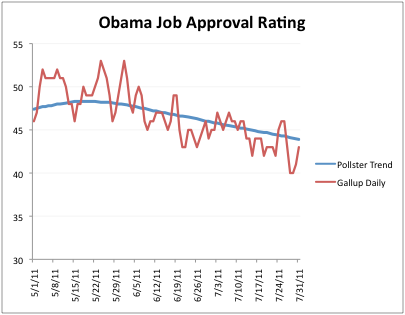
The decline in Obama's approval ratings parallels similar drops over the same period in poll ratings of both Democrats and Republicans in Congress. While shifts in such ratings are always difficult to attribute to a single cause -- and the economic news has been particularly bad over the past two months -- the declines also parallel the significant coverage of the debt ceiling debate in July. According to the News Coverage Index of the Pew Research Center's Project for Excellence in Journalism, stories about the debt and deficit have made up more than a quarter of the stories in newspaper, online, television and radio news over the past two weeks, and have exceeded stories about the economy for the last four weeks.
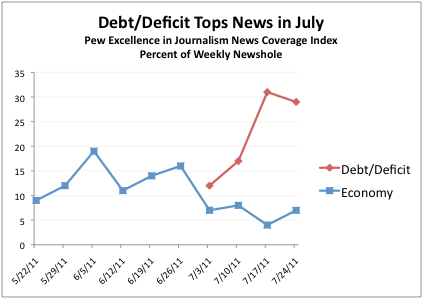
These parallel trends suggest that the ongoing debate about the debt ceiling has at least contributed to the declines in ratings of political leaders across the spectrum over the last month. The image confronting voters, in the face of relentlessly negative economic news, is one of a government in disarray and on the verge of inflicting even more economic pain through its own dysfunction. A Washington Post/Pew Research Center poll conducted last week in the midst of negotiations asked Americans to describe the ongoing budget negotiations in one word. The three most mentioned words were "ridiculous," "disgusting" and "stupid," and according to the Washington Post's Jon Cohen, just 2 percent "had anything nice to say."
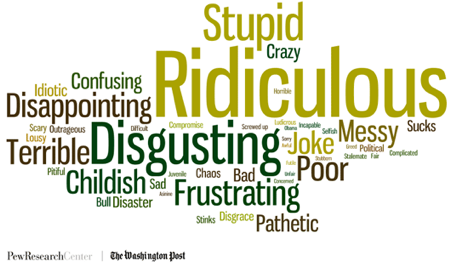
Will the bipartisan agreement reached by President Obama and the leaders of Congress, should it pass, help reverse those trends? The lessons of the bipartisan budget deal from December 2010 are instructive, but differences in the political environment and leadership response suggest the public reaction may be different this time.
Initial reaction to the December 2010 deal as measured by media polls was overwhelmingly positive, although some of that reaction may have been due to question wording that emphasized the extension of tax cuts in the package. For example, the CNN/Opinion Research Corporation poll found 75 percent support for the bill after explaining that it had been passed by Congress and signed by Obama and that it would "extend tax cuts for all Americans, reduce the estate tax, extend unemployment benefits, and reduce the Social Security tax that workers pay." Similarly, the Fox News poll found 68 percent support for the agreement that "allows the Bush-era tax cuts to continue for all Americans for two years in exchange for extending the unemployment benefits."
The debt ceiling agreement is a bipartisan compromise and involves significant reductions in spending and the federal deficit, two things Americans told pollsters they wanted. However, a package of spending cuts may sound less promising in a poll question than tax cuts.
The more important lesson from December may be the reactions of political leaders outside the Obama administration. Although many found fault with the December agreement, the leadership of both parties praised the budget agreement and the ensuing coverage amounted to what political scientists call a one-message environment (in which they hear mostly praise but little of the usual partisan criticism). That environment was prolonged in January following Obama's national addresses in the aftermath of the shooting of Rep. Gabrielle Giffords (D-Ariz.) and others in Arizona.
So a lot was going on in January, including a short-lived boost in consumer confidence. The net result was a modest increase in Obama's job approval rating and similar increases in ratings of Republicans in Congress, Democrats in Congress and Congress as a whole.
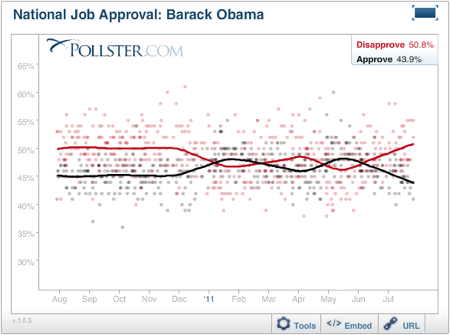
The initial reactions of leaders to the recent debt deal, other than Obama and Biden, has been tepid at best, particularly among the Democrats. Senate Majority Harry Reid (D-Nev.) stressed the "historic, bipartisan agreement," but others have been more guarded. House Minority Leader Nancy Pelosi (D-Calif.) is reportedly undecided about how she will vote. And, of course, prominent liberals have been unusually livid. Emanuel Cleaver (D-Mo.), chairman of the Congressional Black Caucus, called the deal a "sugar coated satan sandwich" on Sunday night. Raul Grijalva (D-Ariz.), chair of the Congressional Progressive Caucus, said he will "have no part of a deal that cuts Social Security, Medicare and Medicaid to appease the farthest reaches of the right wing of the Republican Party."
The angry reaction among liberal representatives and media pundits could put negative pressure on Obama's ratings since, up until now, liberal Democrats have remained steadfast in their approval of Obama. As measured by the Gallup Daily tracking poll, Obama's approval among liberal Democrats has varied between 80 and 90 percent since the early days of his administration. Should Obama's numbers begin to decline among Democrats beyond the range measured over the last year, his overall rating could fall below 40 percent.
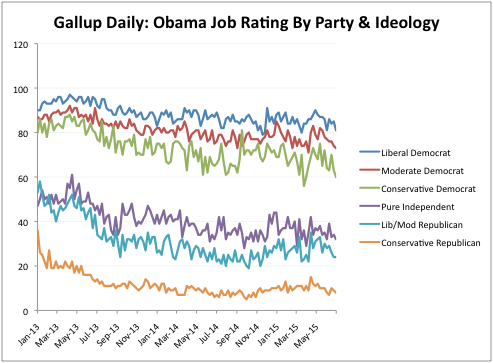
This is speculation, of course, until we have further polling data. Ultimately, the direction of the economy will trump any short-term changes, but we should have a sense for the immediate reaction in a few days.
